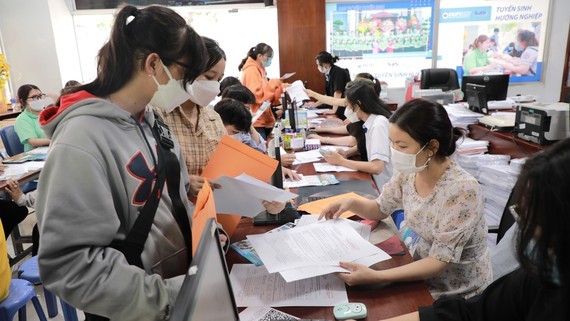 Candidates register for university enrolment
Candidates register for university enrolment
This is the right policy, but the problem is to ensure the output to both attract learners and avoid wasting the budget.
According to the regulations, customized training courses are designed following the request of provincial people's committees, organizations, and units using the state budget which are committed to employing graduates according to the contract between the two parties.
Regarding university entry points, the Ministry of Education and Training stipulates that candidates for the customized training must have a qualifying score higher or equivalent to the score of the training program. In case provincial people's committees send candidates for the special training for agencies, organizations and enterprises in provinces in the Northwest, Central Highlands, and Southwest regions, candidates who have studied for three years at a local high school must have a permanent residence for three years or more.
On the other hand, chairpersons of provincial people's committees who decided to send candidates for customized training must be accountable for the demand for training orders and employment of post-trained laborers.
According to the representative of the Ministry of Education and Training, the enrollment is done by the State and the units using the training order budget according to Decree 32/2019 dated April 10, 2019, on task assignment, ordering, or bidding.
Customized training is the government’s right policy for solving the problem of high-quality human resources for the three regions of the Northwest, the Central Highlands, and the Southwest - which are the three most underprivileged regions in the country.
According to Dr. Hoang Ngoc Vinh, a member of the Advisory Group of the National Committee for Innovation in Education and Training for the 2016-2021 period, customized training is the right solution to ensure the supply and demand of human resources in general and teachers in particular. If going to school under a local contract, the locality must be responsible for assigning work arrangements to graduates as committed.
Teacher Pham Thai Son, Director of the Center for Admissions and Communication of the Ho Chi Minh City-based University of Food Industry said that after one year of implementation, candidates showed their indifference to customized training according to the report of the Ministry of Education and Training because learners have not had better jobs after graduation.
For example, many schools reported a shortage of teachers, but a few years later, schools might recruit enough teachers.
At that time, candidates sent for customized training will not find a job after graduation. Therefore, while selecting candidates for customized training courses, local leaders must have clear notices, commitments, and instructions for the employment of candidates after graduation to reassure them. Furthermore, local administrations must write clearly candidates’ wages and priority regimes for candidates after graduation.
Prof. Hua Minh Tuan, former Vice Principal of the University of Finance and Marketing in Ho Chi Minh City, said that local administrations and ministries need to identify, calculate, and forecast human resources before sending candidates for the special training course avoiding abundancy but still shortage.
According to Decree 116/2020/ND-CP, provincial people's committees calculate and determine the recruitment and training needs of local teachers in each grade and subject and they submit reports to the Ministry of Education and Training. On that basis, the Ministry of Education and Training announces the enrolment quota for teacher training institutions.
























